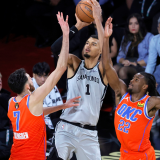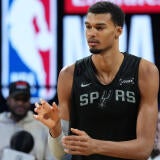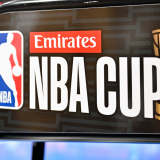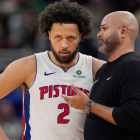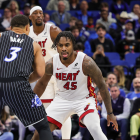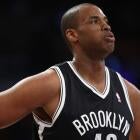
The problem with Phil Jackson's 'vision quest' for Knicks enlightenment
Zen Master may be taking this approach a bit far

Over at Today's Fastbreak, Charley Rosen continues his series of dispatches from Phil Jackson, released several months after they were written by Jackson throughout the season. It continues to be a fascinating insight into the mind of the Knicks president. In the latest dispatch, Jackson discusses Derek Fisher and the reasons he elected to part ways with the coach. Jackson admits that Fisher had off-court issues (like his dispute with Matt Barnes) but Jackson says that the real problem was how Fisher approached the players.
"And because Derek was still in a player's mindset, he'd talk to the guys about diet, how to approach shootarounds, the importance of gameday naps, of game preparation, and of being ready for the practices that are called the day after games. He was training individuals, which was really in tune with the so-called millennials, young people and young players who are primarily interested in themselves. In the NBA, these young guys are concerned with what playing for whatever team they're on can do for them. Can playing in New York or Boston or LA or wherever add 10K followers to my Twitter account? Will the local media get me lucrative endorsements? What do I have to concentrate on to get a better contract?"
"One difference I had with Derek is that I'm much more interested than he was in training groups. The Knights of the Round Table kind of thing.
"There's a movement called Humanistic Psychology that appeals to me, especially the work of Abraham Maslow and Carl Rogers. In the context of this basketball team, it's about creating a comfortable, secure workspace to help and encourage the players to self-actualize with the end of enabling them to grow together as a group."
"You could also say that the season is a process, something like an extended group therapy session, or a vision quest. The ultimate group goal being to win a championship. This is a different managerial style, a different paradigm, that's far from the norm in the NBA."
Source: The Phil Jackson Chronicles Part 5 - Firing Fisher.
OK, there's a lot of interesting things here, but let's talk about just a few of them.
1. It's becoming more and more clear that Jackson sees his purpose as Knicks president to win an NBA title, sure, but more importantly maybe to spark some kind of broader change in the way basketball exists in the NBA.
This makes a lot of sense given his background. Jackson is the son of a preacher who was in his 20s during the late 60's and early 70's, when he experimented with hippie culture. Cultural change is in his DNA. Jackson has consistently talked about wanting to build a basketball collective and about the "spirit" of the team. This kind of philosophic or mystical basketball has always been a big part of his approach as a coach. The issue is that the Knicks actually do need nuts and bolts, brick-and-mortar changes to their organization. Jackson lamented in one of those chronicles about the lack of fundamentals current players face. However, that kind of frustration doesn't change that these players have to learn those things before they can become self-actualized as a player or adopt the triangle.
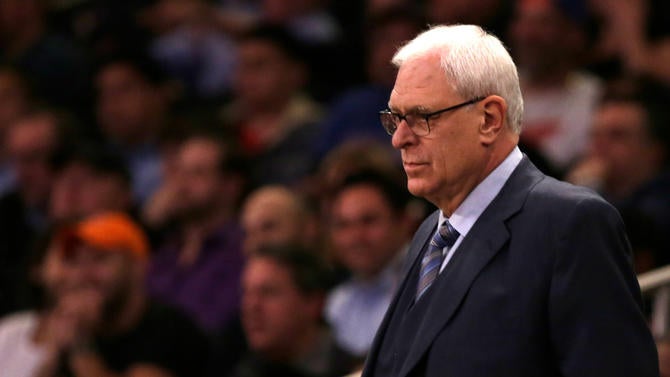
2. The humanistic psychology stuff is largely contradictory.
Some nuts and bolts basics on what he's talking about here. Maslow built this thing called the "Hierarchy of Needs." It's basically about how you have to handle certain needs like food, shelter, and then safety, and then confidence and belonging before you can be what is called "self-actualized." (Think of it as being the most you can be on a personal level.) So Jackson's talking about creating a space that would enable players to be self-actualized. But in the same breath, he's criticizing Fisher for effectively trying to help provide those players with those other elements which are in pursuit of self-actualization. And he's criticizing those players for things like their interest in social media, but that fits directly into a sense of belonging, which is in Maslow's hierarchy.
In short, Jackson is criticizing Fisher for engaging in behavior that was empathetic toward the individual, which is a core tenet of humanistic psychological therapy. Jackson's pursuit of a communal concept that grows and encourages the group also seems insane given the history of Jackson's championship teams. Players are concerned with their contracts now? You mean like how every player on the Bulls was obsessed with his or her contract and being underpaid, as chronicled in Sam Smith's "The Jordan Rules" and David Halberstam's "Playing for Keeps?"
Players are concerned about their own role and position in the league, like the Shaq-Kobe divide in the early 2000's?
There are definitely differences with the Millenial generation and how it struggles to relate with coaches in this league. But the issues that Jackson prompts aren't part of that, they're part of the deal when it comes to NBA players across any generation. Surprise: professional athletes want to be highly paid and very popular.
3. This definitely prompts the question of how Jeff Hornacek will adapt.
Again, Jackson's not looking to just make a better basketball team (which is all Knicks fans want), he wants to somehow create an environment that lifts the very idea of what a professional basketball team is, spiritually. Is that realistic? Is it plausible? Here's a better question. Does it matter? Jackson's "vision quest" seems like a lofty goal for a team that struggled to score and defend last year.
If Jeff Hornacek is able to get the team to do those things at a better level, but Jackson still feels the team isn't in sync with one another spiritually, is that a problem?
Jackson might want to consider the idea of a hierarchy of needs for the Knicks, which starts with, you know, the basketball side.



